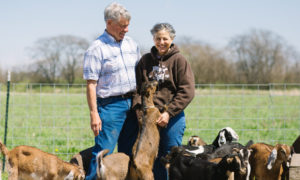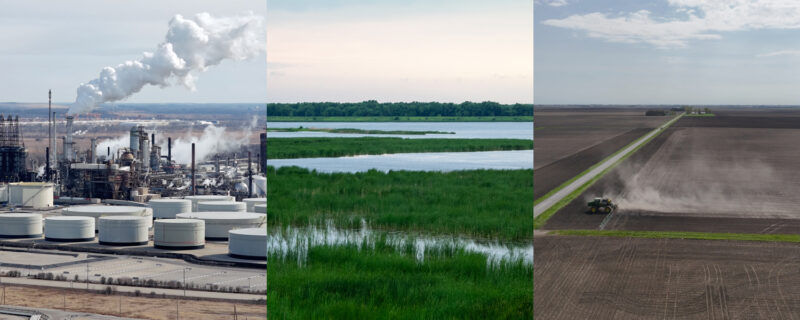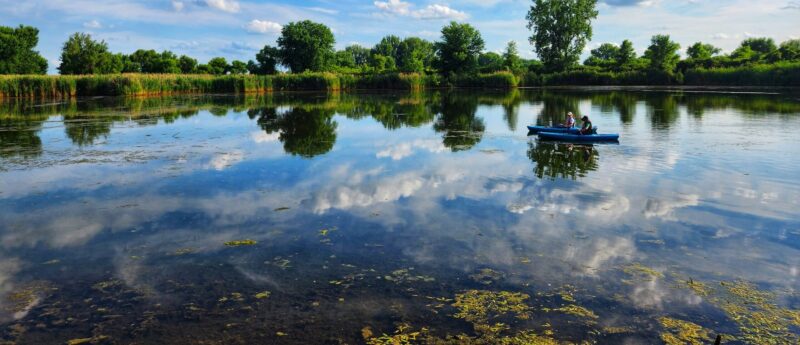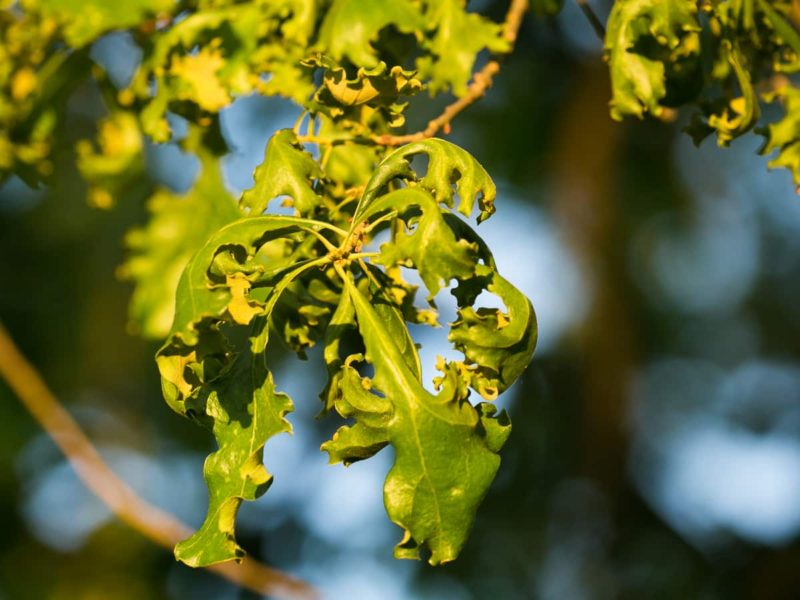A Healthy Land Means a Healthy Ecosystem
Food production and conservation can go hand-in-hand.
Problem: Business As Usual Threatens Water Quality and Degrades Soil
Illinois is dominated by corn and soybeans. These crops are planted every year with the use of large quantities of chemical fertilizers, herbicides, fungicides, insecticides, (in combination with genetically modified seeds), in order to maximize yield and prevent other species, whether plant or animal, from invading fields. This type of farming harms wildlife, pollutes drinking water resources, and destroys important organisms in soil that keep it productive. Soil isn’t dirt. Good, healthy soil is a living natural resource essential to farming and food production. Healthy soil is not just about keeping it in place. Soil is an ecosystem, and a healthy soil is a robust ecosystem full of a diverse range of soil organisms. Current, wide scale use of conventional farming practices strip Illinois farmland of its vital, rich soil.
Solution: Regenerative and Organic Farming Practices
 Whether it’s a small farm or a large one, there are many ways to have a productive farm and be aligned with nature. The use of regenerative agricultural practices is on the rise. More and more farmers are using cover crops and keeping the soil covered year-round. They are increasing the number of and types of crops they grow in a year, adding livestock to the land, using alternative methods of weed and pest control, and using native habitat on their farms to improve productivity and to protect water quality. By farming with soil health principles and systems, farmers increase their soil’s organic matter and improve microbial activity. As a result, farmers are sequestering more carbon, increasing water infiltration, improving wildlife and pollinator habitat—all while harvesting better profits and often better yields. Investing in soil health is an essential step to transition to a regenerative farming system. Prairie Rivers Network is an active partner with the Soil and Water Conservation Districts, conservation groups, our partners in ReGenerate Illinois, the IDEA Farm Network, and agriculture producer groups around the state and the nation. Additionally, there are numerous research institutions, farmer-led learning networks (such as the IDEA Farm Network, Practical Farmers of Iowa, and MOSES), and NGOs that are working hard to help farmers of all types share information, improve productivity, protect resources such as air, water, and soil, and improve their own lives, as well as those in their community. We strive to find ways to build a more resilient food system, one that protects the environment, rebuilds healthy rural communities, provides healthy, nutritious food, and provides farmers with a just and fair wage for the hard work they do. For more information about what we are doing with some of our partners please visit www.regenerateillinois.org. Key actions that we are working on include:
Whether it’s a small farm or a large one, there are many ways to have a productive farm and be aligned with nature. The use of regenerative agricultural practices is on the rise. More and more farmers are using cover crops and keeping the soil covered year-round. They are increasing the number of and types of crops they grow in a year, adding livestock to the land, using alternative methods of weed and pest control, and using native habitat on their farms to improve productivity and to protect water quality. By farming with soil health principles and systems, farmers increase their soil’s organic matter and improve microbial activity. As a result, farmers are sequestering more carbon, increasing water infiltration, improving wildlife and pollinator habitat—all while harvesting better profits and often better yields. Investing in soil health is an essential step to transition to a regenerative farming system. Prairie Rivers Network is an active partner with the Soil and Water Conservation Districts, conservation groups, our partners in ReGenerate Illinois, the IDEA Farm Network, and agriculture producer groups around the state and the nation. Additionally, there are numerous research institutions, farmer-led learning networks (such as the IDEA Farm Network, Practical Farmers of Iowa, and MOSES), and NGOs that are working hard to help farmers of all types share information, improve productivity, protect resources such as air, water, and soil, and improve their own lives, as well as those in their community. We strive to find ways to build a more resilient food system, one that protects the environment, rebuilds healthy rural communities, provides healthy, nutritious food, and provides farmers with a just and fair wage for the hard work they do. For more information about what we are doing with some of our partners please visit www.regenerateillinois.org. Key actions that we are working on include:
- Work with farmers and agricultural purchasers to promote the benefits of regenerative agricultural systems that improve soil health and water quality, and capture carbon
- Develop and implement certification programs for conservation farmers that are based on rigorous metrics and reflect real water quality improvements
- Push major agricultural purchasers to develop programs to buy from certified farmers, and to market new “conservation certified” products
- Reform tax, land-use, environmental, and farm-subsidy policies to reduce the unfair economic advantages enjoyed by conventional industrial production methods











